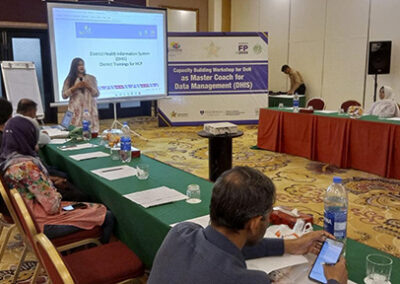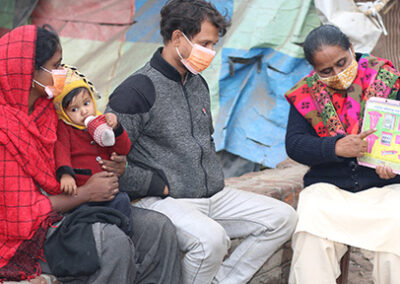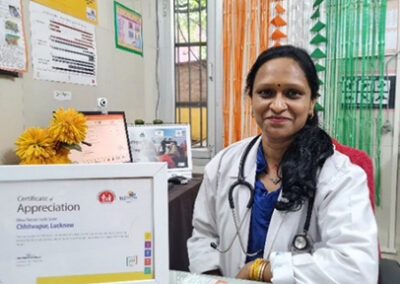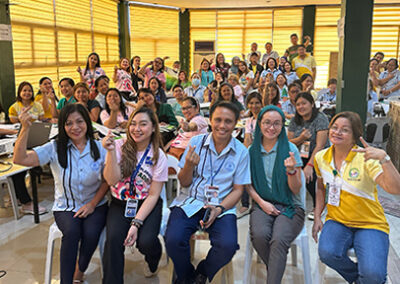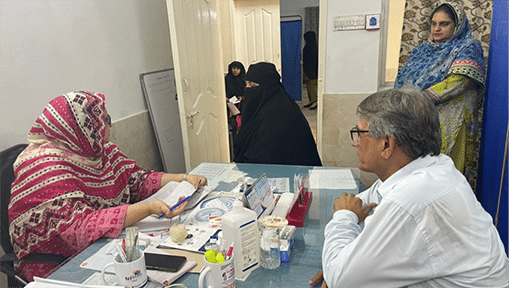
Dr. Pirzada discusses progress made with whole-site orientations with Women Medical Officers.
Dr. Uzair Ahmed Pirzada is the Deputy District Health Officer (DDHO) for District Central in Karachi, Pakistan. He recently recounted his transformative journey with The Challenge Initiative (TCI), which began in May 2022.
Dr. Pirzada said before TCI began supporting Sindh province, he felt more confident providing maternal and child health (MCH) services, although he had some experience with family planning. His interests shifted as TCI initiated the program design progress within Sindh, where both the Health and Population Welfare Departments participated. During the program design, Dr. Pirzada’s understanding of family planning expanded, positioning him as a key player in TCI’s mission.
Family Health Days and PPFP
In September 2022, District Central began implementing Family Health Days (FHDs), one of TCI’s high-impact interventions (HIIs), with support from TCI and the Population Welfare Department. The MCH center in District Central was the site selected for implementing FHDs, but challenges arose during implementation, particularly with data recording systems and staff capacity in postpartum and post-abortion family planning (PPFP/PAFP) services. Dr. Pirzada said:
We realized that the data was not captured completely. There were missing entries, and more importantly, the staff didn’t fill in indicators related to family planning in the registers. The staff’s understanding related to postpartum and post-abortion clients was inadequate. They did not ask for and capture critical information to identify whether the woman came within the postpartum and post-abortion period. This also resulted in missed opportunities at the facility level because these women were not then prioritized and did not receive counseling for family planning.”
Realizing the need to strengthen staff capacity, Dr. Pirzada initiated a collaborative effort with TCI, engaging various stakeholders using TCI’s “Lead, Assist, and Observe” coaching model. Through capacity-building sessions and monthly meetings, they addressed shortcomings in data management and service delivery, which had led to increasing numbers of women accessing postpartum services at facilities.
TCI conducted PPFP/PAFP trainings for our staff that didn’t just enhance their knowledge in the service delivery area but also data management. Since then, we are seeing increasing numbers of women postpartum being served at the facility. We have also started receiving the data, which is entered in DHIS.”
Commodity Supply Management
With TCI’s support, Dr. Pirzada’s team also improved their commodity management systems, contributing to a significant increase in family planning clients at their facilities. He noted:
Previously we did not pay much attention to FP commodities and the inventory management system, resulting in either stockouts or expired commodities. Now, we consciously keep tabs on inventory management and request the necessary FP commodities according to the need for family planning services.”
Generating Demand in the Community and at the Facility
He said his team is now trying to integrate family planning with the Expanded Program for Immunization (EPI). Typically, Lady Health Workers (LHWs) generate demand for family planning in the community, but Dr. Pirzada wanted to also target women coming to the facility for other health services, such as getting their children vaccinated.
In the last two months, of the 20 FHDs conducted, LHWs were engaged in only six. In the other 14 FHDs, our health facility staff took ownership and generated demand for family planning. In these FHDs, 1,609 clients visited the facilities for general outpatient department (OPD) services. Of these, 949 women opted for family planning methods. LHWs only cover 10% of the population in our district, while vaccinators cover the remaining 90%. In our next program design, we recommend utilizing vaccinators in these interventions as they have a high outreach engagement and are directly involved with mothers, so they can also orient on family planning. We will not miss any woman in need.”
Dr. Pirzada attributed higher client volume to capacity-building sessions for LHWs.
We improved their counseling skills for family planning. Also, we guided them that if a woman is seeking a method (any family planning method), she should be provided with a method immediately. Previously, we used to wait for a Family Health Day to happen, but now we tell the LHW to bring in the client to a regular OPD. This technique has improved our patient influx in general and for family health days.”
TCI University
Dr. Pirzada said TCI University became a valuable resource on this journey for continuous learning and capacity building, motivating him and his team to share their newfound knowledge with Lady Health Supervisors and LHWs.
We realized that [TCI-U] is comprehensive and has everything one needs to effectively implement any family planning project. Within the toolkit, we also found the Pakistan toolkit, a beautiful combination of three themes: service delivery, demand generation, and advocacy, and we realized that we could learn so much from TCI University. My team started acquiring certifications, and then we began competing with one another to see how many certificates one can have, which also motivated me and my team.”
With TCI support and a focus on sustainable improvement in family planning, Dr. Pirzada and his team are ensuring that no opportunities for service delivery are missed, contributing to the overall health and well-being of their community.

